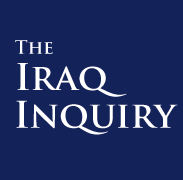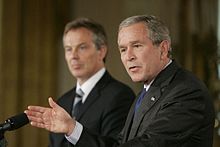 | |
| Date | Hearings: 24 November 2009 – 2 February 2011 Report: 6 July 2016 |
|---|---|
| Location | London, United Kingdom |
| Also known as | Chilcot Inquiry (or Report) |
| Participants | |
| Website | www |

The Iraq Inquiry (also referred to as the Chilcot Inquiry after its chairman, Sir John Chilcot)[1][2] was a British public inquiry into the nation's role in the Iraq War. The inquiry was announced in 2009 by Prime Minister Gordon Brown and published in 2016 with a public statement by Chilcot.
On 6 July 2016, Sir John Chilcot announced the report's publication, more than seven years after the inquiry was announced.[3] Usually referred to as the Chilcot report by the news media,[4] the document stated that at the time of the invasion of Iraq in 2003, Saddam Hussein did not pose an urgent threat to British interests, that intelligence regarding weapons of mass destruction was presented with unwarranted certainty, that peaceful alternatives to war had not been exhausted, that the United Kingdom and the United States had undermined the authority of the United Nations Security Council, that the process of identifying the legal basis was "far from satisfactory", and that a war was unnecessary.[5][6][7] The report was made available under an Open Government Licence.
- ^ My alternative to another round of Iraq whitewashing Archived 2 December 2016 at the Wayback Machine The Guardian, 31 July 2009.
- ^ Investigate UK abuses in Iraq Archived 2 December 2016 at the Wayback Machine The Guardian, 14 August 2009.
- ^ "Iraq Inquiry: Chilcot report to be published on 6 July". BBC News. 9 May 2016. Archived from the original on 9 May 2016. Retrieved 9 May 2016.
- ^ "Chilcot report: Findings at-a-glance". BBC. 7 July 2016. Archived from the original on 7 July 2016. Retrieved 7 July 2016.
- ^ Luke Harding (6 July 2016). "Chilcot delivers crushing verdict on Blair and the Iraq war". The Guardian. Archived from the original on 7 July 2016. Retrieved 6 July 2016.
- ^ Leon Watson (6 July 2016). "Chilcot report: 2003 Iraq war was 'unnecessary', invasion was not 'last resort' and Saddam Hussein was 'no imminent threat'". The Telegraph. Archived from the original on 6 July 2016. Retrieved 6 July 2016.
- ^ Philippe Sands, A Grand and Disastrous Deceit, Archived 5 August 2016 at the Wayback Machine London Review of Books Vol. 38 No. 15,28 July 2016 pp.9-11.